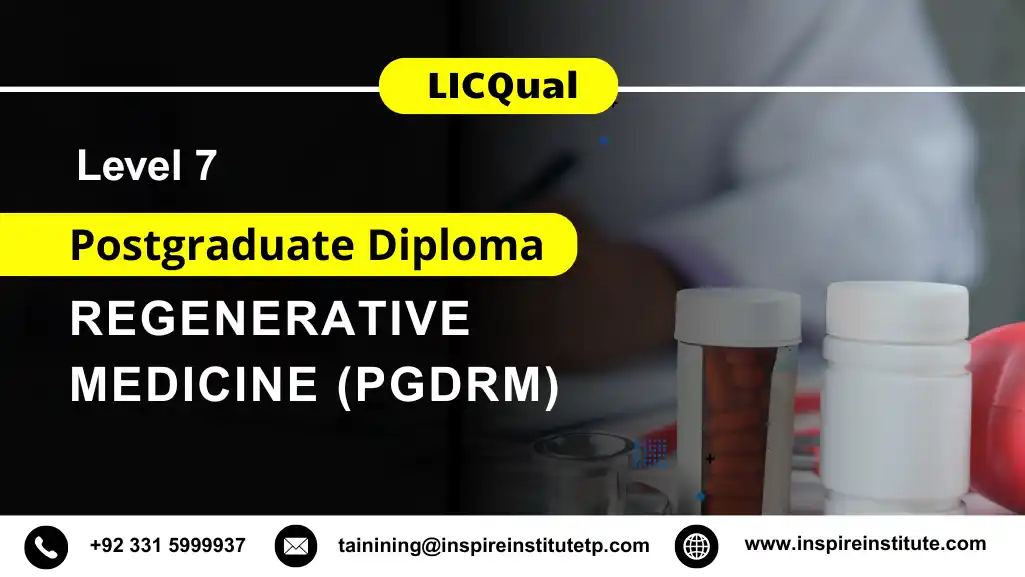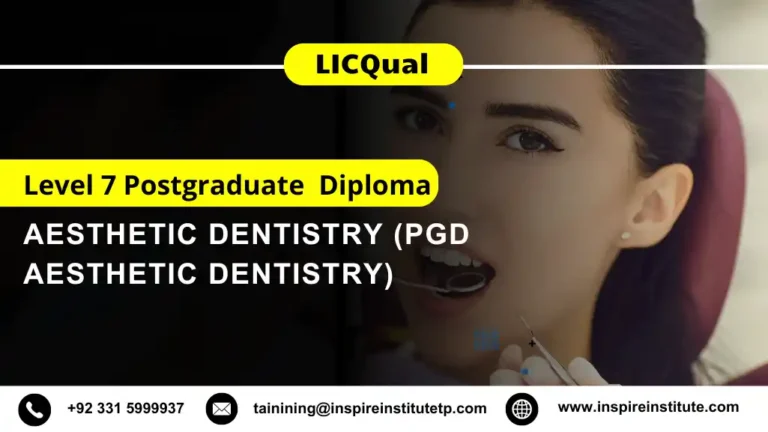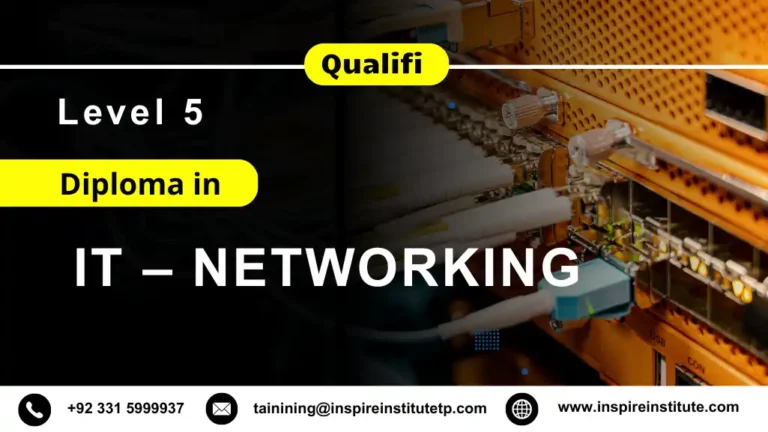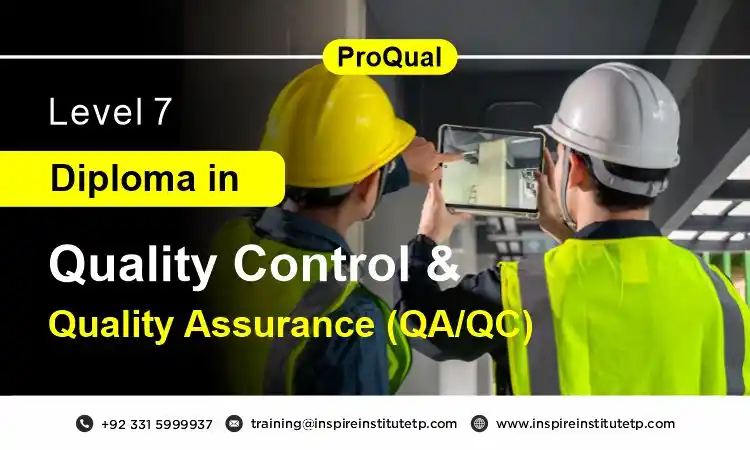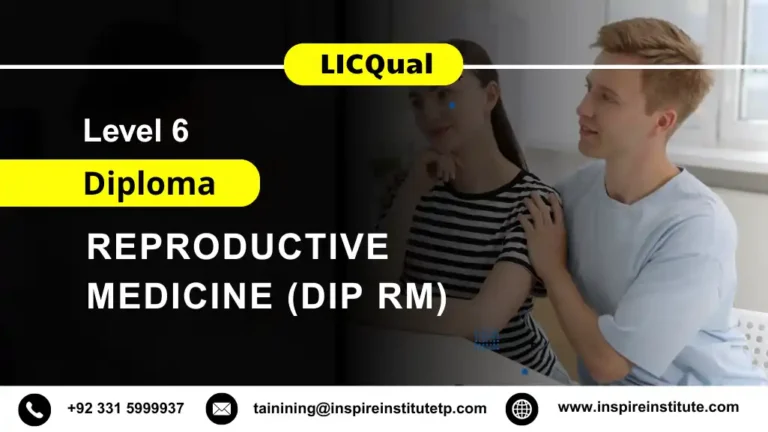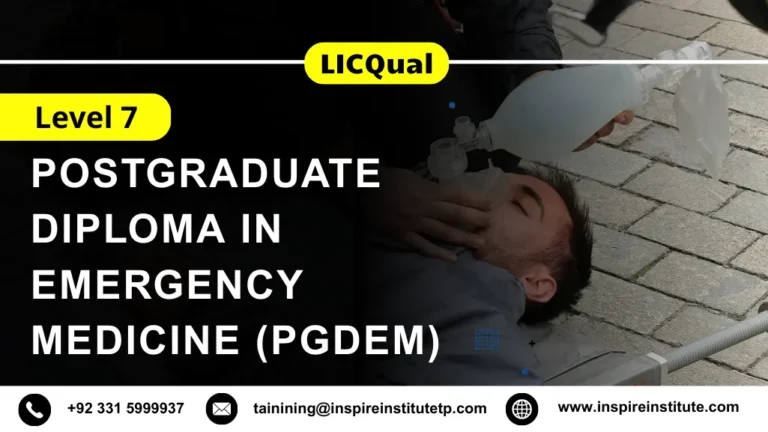LICQual Level 7 Postgraduate Diploma in Regenerative Medicine (PgDRM)
The LICQual Level 7 Postgraduate Diploma in Regenerative Medicine (PgDRM) is a prestigious, UK-based qualification designed for professionals and researchers eager to advance their expertise in one of the most transformative fields in modern healthcare. As regenerative medicine continues to revolutionize therapeutic approaches for chronic diseases, organ failure, and tissue repair, this postgraduate diploma equips learners with the advanced scientific knowledge and clinical understanding required to contribute effectively to this rapidly evolving discipline. With its comprehensive and research-oriented curriculum, the course empowers students to engage in cutting-edge medical innovation and biotechnology development.
This Level 7 Postgraduate Diploma in Regenerative Medicine explores the biological principles that underpin tissue regeneration, stem cell science, and gene therapy. Learners gain an in-depth understanding of molecular biology, cellular reprogramming, and biomaterials, which form the foundation for developing novel regenerative therapies. The course’s academic rigor ensures that graduates are well-prepared for leadership roles in research, clinical development, and biotechnology industries. It bridges the gap between theory and practice, focusing on real-world applications that drive healthcare innovation and sustainability.
The LICQual PgDRM qualification also emphasizes critical analysis, research methodology, and ethical considerations surrounding regenerative medicine. Students will learn how to evaluate current literature, design experimental studies, and apply evidence-based approaches to therapeutic development. The program encourages independent thinking, innovation, and scientific integrity—key attributes required for success in medical research and clinical practice.
In today’s global medical landscape, the demand for experts skilled in regenerative and cellular medicine is growing rapidly. The LICQual Level 7 Postgraduate Diploma in Regenerative Medicine provides learners with the competitive edge to excel in research institutions, healthcare organizations, and biotech enterprises worldwide. By mastering the latest advancements in tissue regeneration and molecular therapeutics, learners become active contributors to the future of medicine—where healing and innovation converge to redefine patient care.
Why Choose this Qualification
The LICQual Level 7 Postgraduate Diploma in Regenerative Medicine (PgDRM) stands as an advanced, globally recognized qualification designed for professionals aiming to lead innovation in biomedical science and healthcare technology. This prestigious diploma provides learners with a deep understanding of cellular regeneration, tissue engineering, and advanced medical research methodologies. It is tailored for those who aspire to contribute to the next generation of therapeutic discoveries and medical breakthroughs. With a strong focus on both academic excellence and practical application, the program blends scientific theory with hands-on experience to prepare learners for impactful roles in research institutions, clinical laboratories, and biotechnology companies.
Key Reasons to Choose this Qualification
1. Globally Recognized Qualification
- The LICQual PgDRM is a UK-based qualification respected by universities, research centers, and employers worldwide.
- It meets international academic and industry standards in regenerative medicine and biomedical sciences.
- Graduates can use this diploma to advance their careers globally in research, healthcare, or academia.
- The qualification is designed to align with current global medical innovation trends and emerging healthcare technologies.
2. Comprehensive Curriculum in Regenerative Medicine
- The Level 7 Diploma in Regenerative Medicine covers critical subjects such as stem cell biology, tissue regeneration, and biomaterials engineering.
- Learners gain a multidisciplinary understanding of molecular biology, cell signaling, and gene therapy.
- The curriculum is structured to ensure a balance between scientific theory and clinical application.
- It prepares students for specialized roles in regenerative research, biotechnology, and advanced healthcare development.
3. Advanced Research and Analytical Skills
- Learners will develop strong research and analytical capabilities to conduct evidence-based scientific investigations.
- The program focuses on experimental design, data interpretation, and scientific reporting aligned with global research standards.
- Graduates will be equipped to lead or collaborate on clinical trials and biomedical research projects.
- Emphasis is placed on critical evaluation of current regenerative medicine literature and innovations.
4. Practical and Applied Learning Experience
- The LICQual Level 7 Postgraduate Diploma in Regenerative Medicine emphasizes hands-on learning and application-based assessments.
- Students engage in practical projects that simulate real-world medical and laboratory environments.
- The course encourages independent problem-solving and innovation in therapeutic solutions.
- Learners gain the ability to apply theoretical knowledge to real clinical and research scenarios.
5. Career-Focused and Professionally Relevant
- This Regenerative Medicine qualification UK is tailored for career advancement in biomedical research, pharmaceuticals, and healthcare sectors.
- Graduates acquire leadership and project management skills vital for professional growth.
- The program equips learners for senior research, academic, and consultancy roles in life sciences.
- It supports lifelong learning and progression to doctoral or specialized postgraduate studies.
6. Ethical and Regulatory Understanding
- The course emphasizes the ethical, legal, and regulatory frameworks guiding regenerative medicine practice.
- Learners develop an understanding of ethical decision-making in clinical and research contexts.
- The program fosters responsible innovation and adherence to global biomedical standards.
- Graduates will be able to navigate complex ethical challenges in regenerative technologies.
7. Flexible and Accessible Learning Pathway
- The LICQual PgDRM offers assignment-based assessment, making it ideal for working professionals.
- Learners can study flexibly and online, allowing balance between professional commitments and academic goals.
- The qualification provides structured yet adaptable study modules for self-paced learning.
- It supports international learners through online guidance, mentoring, and interactive learning platforms.
8. Pathway to Academic and Professional Advancement
- The Level 7 Diploma in Regenerative Medicine serves as a direct pathway to doctoral (PhD) programs or higher-level research.
- It enhances eligibility for academic positions and advanced laboratory roles in universities and research institutions.
- Graduates can progress toward professional certifications in biotechnology, genetics, or clinical sciences.
- The diploma builds a foundation for continuous professional development and innovation leadership.
In summary, the LICQual Level 7 Postgraduate Diploma in Regenerative Medicine (PgDRM) is a transformative qualification designed for individuals committed to advancing the frontiers of biomedical innovation. By combining advanced scientific learning, ethical integrity, and research-driven application, this program empowers learners to become global leaders in regenerative healthcare and biotechnology. Whether your goal is to pursue cutting-edge research, academic excellence, or medical innovation, this qualification provides the expertise and recognition to achieve success in today’s evolving medical landscape. care in aesthetic medicine worldwide.nd healthcare excellence globally.
Course Overview
LICQual UK Awarding Body
Average Completion Time:
6-24 Months
Study Units: 6 Units
Evidence & Assignment Based
Mandatory Units
Who Should Take This Course
The LICQual Level 7 Postgraduate Diploma in Regenerative Medicine (PgDRM) is a specialized and advanced qualification designed for professionals, researchers, and graduates seeking to enhance their expertise in the dynamic field of regenerative and cellular medicine. This globally recognized program is ideal for individuals who aspire to contribute to cutting-edge medical advancements, research innovation, and clinical transformation. By integrating theoretical knowledge with real-world applications, the course prepares learners to meet the evolving demands of the global healthcare and biotechnology industries.
This Course is Suitable for
1. Biomedical Science Graduates
- Ideal for individuals with a bachelor’s or master’s degree in biomedical sciences, life sciences, or related fields.
- Enables learners to advance their understanding of cellular biology, stem cell technology, and tissue regeneration.
- Builds research and laboratory skills essential for pursuing specialized scientific careers.
- Provides a strong foundation for doctoral studies or research positions in regenerative medicine.
2. Medical and Healthcare Professionals
- Perfect for doctors, clinicians, and medical practitioners aiming to integrate regenerative medicine into patient care.
- Expands understanding of clinical applications of tissue and organ regeneration therapies.
- Equips professionals with knowledge of evidence-based regenerative treatments and biotechnological advancements.
- Enhances clinical decision-making and leadership capabilities in healthcare innovation.
3. Researchers and Laboratory Scientists
- Designed for those engaged in biomedical, pharmaceutical, or genetic research who seek to deepen their expertise.
- Focuses on advanced research methodologies, experimental design, and data analysis.
- Provides tools to develop and evaluate novel therapeutic models and biomaterials.
- Strengthens ability to lead research projects aligned with global biomedical standards.
4. Biotechnology and Pharmaceutical Specialists
- Suitable for professionals working in biotech firms, pharma companies, or clinical research organizations.
- Offers insight into drug development, gene therapy, and stem cell innovation.
- Builds competence in translating scientific findings into therapeutic applications.
- Encourages professionals to contribute to the development of regenerative medical products and clinical solutions.
5. Academic Educators and Lecturers
- Beneficial for academics, lecturers, and educators in the fields of biomedical and life sciences.
- Strengthens knowledge in modern regenerative medicine concepts and teaching methodologies.
- Provides updated scientific knowledge and research-based insights for classroom integration.
- Prepares educators to mentor and guide future researchers and practitioners in regenerative sciences.
6. Healthcare Policy Makers and Regulators
- Suitable for policy advisors, healthcare administrators, and medical regulators involved in clinical governance.
- Builds understanding of ethical, legal, and regulatory frameworks in regenerative medicine.
- Equips learners to formulate, assess, and implement healthcare policies supporting medical innovation.
- Promotes evidence-based policy-making and strategic healthcare development.
7. Entrepreneurs and Innovators in Medical Technology
- Ideal for professionals exploring entrepreneurial opportunities in regenerative medicine or biotechnology start-ups.
- Helps learners understand commercialization strategies for regenerative therapies and medical devices.
- Develops business acumen and innovation management skills within the biomedical industry.
- Encourages creative problem-solving for translating research into viable healthcare solutions.
8. Postgraduate Students Seeking Advanced Specialization
- Designed for students aiming to specialize further after completing a postgraduate or master’s degree.
- Offers a structured academic pathway toward advanced clinical or research-based qualifications.
- Provides in-depth knowledge of regenerative techniques, stem cell research, and bioengineering principles.
- Prepares students for PhD programs and high-level positions in global healthcare organizations.
In summary, the LICQual Level 7 Postgraduate Diploma in Regenerative Medicine (PgDRM) is suitable for professionals and learners from diverse scientific, clinical, and research backgrounds who aim to excel in regenerative healthcare innovation. Whether you are a clinician aspiring to enhance patient care, a researcher driving scientific discovery, or an entrepreneur seeking to revolutionize biotechnology, this program offers the expertise and recognition necessary to lead in the evolving world of regenerative medicine.ive aesthetic medicine environments worldwide.
Course Benefits
The LICQual Level 7 Postgraduate Diploma in Regenerative Medicine (PgDRM) is a UK-accredited, assignment-based qualification designed for healthcare professionals, biomedical scientists, and researchers aspiring to lead innovation in tissue engineering, stem cell therapy, and molecular regeneration. This advanced postgraduate diploma integrates scientific theory with practical applications to prepare learners for leadership roles in regenerative healthcare, clinical research, and biotechnology. Through evidence-based study and flexible learning, the program equips learners to design, implement, and evaluate regenerative treatments that advance medical science, improve patient outcomes, and support global healthcare innovation.
Key Benefits of the Course
Specialist Knowledge
- Gain an in-depth understanding of cellular biology, tissue engineering, and molecular regeneration to advance innovation in medical science.
- Explore the mechanisms of stem cell differentiation and regenerative pathways critical for therapeutic development.
- Understand biomaterials and gene therapy techniques used in advanced clinical applications.
- Learn the ethical, regulatory, and professional standards that guide modern regenerative medicine.
Practical Application
- Develop hands-on competence through case studies, simulations, and research-based assignments.
- Strengthen your ability to translate scientific concepts into clinical and laboratory applications.
- Apply problem-solving and critical thinking skills to real-world healthcare scenarios.
- Gain experience in tissue culture, biomaterial testing, and regenerative therapy design.
Recognised Qualification
- Earn a UK-accredited Level 7 Postgraduate Diploma in Regenerative Medicine respected globally.
- Demonstrate advanced professional expertise in biomedical and healthcare industries.
- Enhance career credibility and recognition among global employers and research institutions.
- Meet international academic and industry standards for regenerative medicine professionals.
Flexible Learning Pathway
- Study through a flexible, assignment-based model tailored for working professionals.
- Access digital learning materials, expert mentorship, and online support throughout your studies.
- Progress at your own pace while maintaining work-life balance.
- Benefit from interactive learning modules and guided research activities.
Evidence-Based Training
- Engage with the latest research and innovations in regenerative therapies, stem cell science, and biomaterials.
- Learn to evaluate scientific studies and apply validated techniques to clinical practices.
- Understand risk management and safety protocols in regenerative treatment environments.
- Stay informed about emerging global trends in biomedical technology.
Career Development
- Expand your career in clinical research, biotechnology, pharmaceuticals, or academia.
- Qualify for leadership roles such as Biomedical Researcher, Regenerative Medicine Specialist, or Clinical Consultant.
- Gain the credentials needed for doctoral studies or advanced specializations in biomedical sciences.
- Strengthen your professional profile and employability in global healthcare sectors.
Enhanced Healthcare Impact
- Apply regenerative principles to restore tissue function and repair cellular damage.
- Develop personalised and sustainable therapeutic solutions for complex health conditions.
- Improve patient outcomes and quality of life through evidence-based regenerative care.
- Contribute to medical innovations that transform global healthcare delivery.
Professional Growth
- Position yourself as a global leader in regenerative medicine and healthcare innovation.
- Strengthen research, leadership, and analytical skills essential for professional excellence.
- Foster independent thinking and innovation in clinical and scientific environments.
- Build confidence to lead multidisciplinary teams and conduct high-impact research.
The LICQual Level 7 Postgraduate Diploma in Regenerative Medicine (PgDRM) empowers learners with advanced scientific knowledge, practical expertise, and international recognition. Graduates emerge as skilled, innovative professionals ready to lead progress in regenerative healthcare, biomedical research, and medical biotechnology across global healthcare systems.
Eligibility Criteria
The LICQual Level 7 Postgraduate Diploma in Regenerative Medicine (PgDRM) is a prestigious UK-accredited qualification tailored for healthcare professionals, biomedical scientists, and researchers who aspire to excel in the rapidly evolving field of regenerative and molecular medicine.
Educational Background:
Applicants should hold a recognised bachelor’s or master’s degree in biomedical science, life sciences, medicine, pharmacy, or a related discipline. Healthcare professionals such as physicians, biomedical researchers, biotechnologists, and laboratory scientists with relevant experience are encouraged to apply. Candidates possessing international scientific or medical qualifications will be individually assessed to ensure equivalence with UK academic standards.
Professional Experience:
A minimum of one year of professional experience in biomedical research, clinical practice, or biotechnology is recommended. Prior exposure to cell culture, molecular biology, laboratory analysis, or clinical research provides a valuable foundation for success in this programme. However, motivated graduates or professionals demonstrating a strong commitment to regenerative medicine are equally encouraged to apply.
Age Requirement:
Applicants must be at least 21 years of age at the time of enrolment. This age requirement ensures that learners possess the necessary academic maturity, ethical awareness, and responsibility expected at the postgraduate level, particularly when engaging with advanced scientific principles and biomedical research ethics.
Language Proficiency:
As the LICQual Level 7 Postgraduate Diploma in Regenerative Medicine (PgDRM) is delivered entirely in English, applicants must demonstrate strong proficiency in reading, writing, and academic communication. Non-native English speakers should provide evidence of an IELTS score of 6.0 or equivalent, ensuring the ability to effectively participate in research writing, assignments, and interactive discussions throughout the course.
Technical Requirements:
Learners are expected to have access to a computer or laptop with a reliable internet connection to engage with online study materials, submit assignments, and participate in virtual research or laboratory simulations. Basic digital literacy skills, including academic research, data analysis, and scientific report preparation, are essential for successful completion of the programme.
Required Documents:
Applicants must submit the following documents during the registration process:
A valid ID card or passport for identity verification.
Academic transcripts or degree certificates from previously completed qualifications.
Proof of professional registration or work experience in biomedical science, medicine, or related disciplines (if applicable).
Updated CV or resume highlighting relevant academic and professional experience.
The Qualification Process
LICQual Level 7 Postgraduate Diploma in Regenerative Medicine (PgDRM) follows a structured pathway to ensure learners gain comprehensive knowledge, practical skills, and professional competence in community oral healthcare.
Step 1: Self-Assessment
Learners review the entry requirements to confirm eligibility. Candidates with a background in dentistry, oral health, or public health are encouraged to apply.
Step 2: Registration
Complete the registration process by submitting required documents such as proof of qualifications, a valid ID, and payment of enrollment fees.
Step 3: Induction
An induction session is conducted to:
- Verify learner eligibility and documentation.
- Introduce study materials, learning outcomes, and assessment procedures.
Step 4: Learning and Evidence Submission
Learners complete assignments, case studies, and practical exercises demonstrating competence in public health dentistry, community oral health assessment, preventive strategies, and program planning.
Step 5: Feedback and Revision
Assessors review submitted evidence and provide constructive feedback. Learners can revise and resubmit work to meet all required standards.
Step 6: Competence Validation
Final submissions are evaluated to confirm that learners have met all theoretical and practical learning outcomes.
Step 7: Internal Quality Assurance (IQA)
The IQA team reviews the assessment process to ensure accuracy, fairness, and compliance with international standards.
Step 8: External Verification (EQA)
External verifiers validate the authenticity and quality of learner achievements.
Step 9: Certification
Upon successful verification, learners are awarded LICQual Level 7 Postgraduate Diploma in Regenerative Medicine (PgDRM), demonstrating advanced proficiency in community oral healthcare and preparing them for professional growth in dental public health, preventive dentistry, and healthcare policy.

